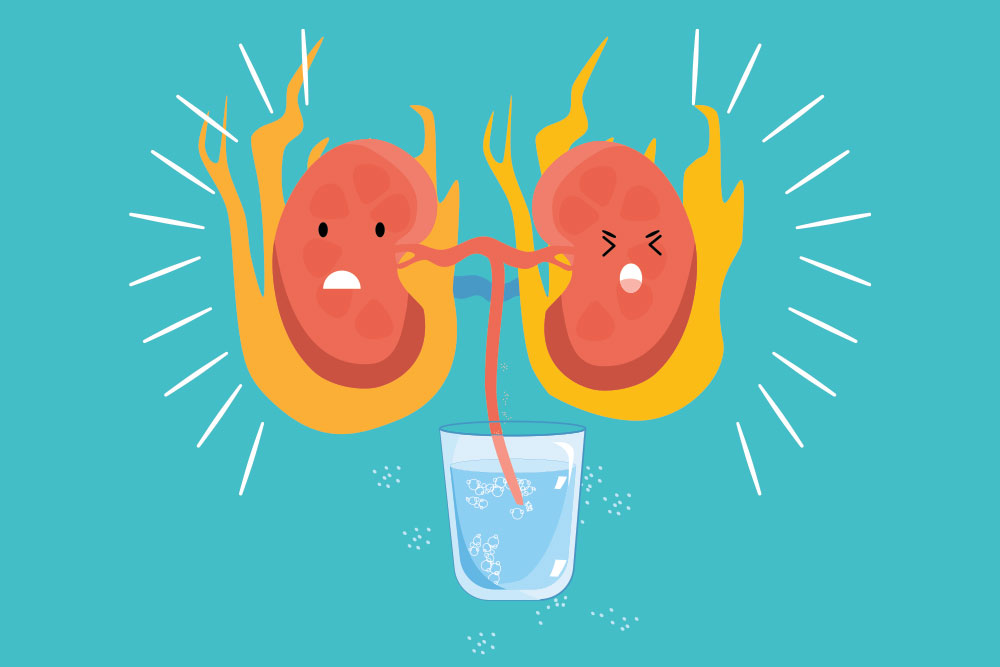Good Kidneys Gone Bad: Renal Impairment

Listen to the article here:
Imagine if your plumbing stopped up. Not your toilets, but your sink and shower. How would you get rid of the dirt and junk off your skin? How would you make sure you stay clean? Our kidneys ask this question every day. The blood in our body travels around and around, including the critical filtration stage of the kidneys. The kidneys act as a big two-way filter. Impurities and excess minerals or water are extracted from the blood, and necessary minerals or water are added as needed. The kidneys keep the ingredients of blood at healthy levels. Finally, kidneys get rid of waste products and extra water by producing urine. When this goes wrong, your blood can’t function properly and waste products can build up.
When dealing with the kidneys, you may see three terms thrown about. The origin of “kidney” is unknown, but likely English. “Renal” is the Latin word for kidneys, and the prefix “nephro-” is Greek in origin. If you see any of these terms you can bet we’re dealing with the kidneys. With this in mind, when the kidneys fail to perform their job, we call it renal insufficiency.
There are two major divisions in how the kidneys fail, based on the amount of time.
- Acute kidney injury (AKI) has a sudden onset. It may affect 100,000 people a year in the United States, with a higher proportion of sufferers being Black or African American than White.
- Chronic kidney disease (CKD) is the long term degradation of the kidneys. It is harder to measure, as the kidneys do a pretty good job compensating: until they don’t. It is estimated that around 2 million Americans may be suffering from CKD, with the majority being men.
There are several possible causes of renal impairment. The vast majority of causes are “upstream,” meaning something affects the blood before it gets to the kidneys.
In acute cases, this can be hypotension – not enough fluid, some drugs, such as NSAIDs, or organ failure. When there isn’t enough fluid in the bloodstream, the kidneys compensate by releasing more water, which can deplete the kidney’s reserves and cause failure.
In chronic kidney disease, the most frequent cause is diabetes, especially type 2. Prolonged hypertension, and vascular diseases can also be the culprit. With chronic cases, the kidneys will do their best to compensate – constantly filtering out excess blood sugar, for instance. Over time, the excess sugar damages the blood vessels in the kidneys. Some parts of the kidneys may fail and the remaining portions get stressed and eventually decompensate. This is when the kidney fails as an organ.
Other possible causes of renal impairment are contained in the kidneys and “downstream” blockages. The kidneys themselve can be the victim of disease or injury, possibly due to long term upstream stress. The ability of the kidney to release urine can also -in rare cases – be disrupted.
Regardless of the cause, renal impairment is very dangerous. The kidneys are responsible for keeping blood healthy. A failure of the renal system can result in a need for dialysis or transplant. Dialysis is when external technology filters blood and maintains levels. This is uncomfortable, cumbersome, and expensive.
Fixing renal impairment can be a tall order. The most important step is usually treating the underlying cause. Since the kidneys filter several drugs out of the bloodstream, stopping or replacing them may be key. Fluids may need to be replaced in acute cases, and lifestyle changes may be needed in chronic ones. Maintaining healthy blood sugar levels can be key if the root cause is diabetes. For heavily progressed chronic renal impairment, dialysis or transplant may be the only options.
Transplant and dialysis are not fun, so we should try to avoid renal impairment before it starts. Many of the tactics to keep your kidneys healthy are the same to keep the rest of your body healthy. Exercise, not overindulging on sugar, and keeping your diet under control can help. Additionally, maintaining a healthy blood pressure is vital. Finally, lowering or cutting out tobacco and alcohol can help keep your kidneys healthy. When it comes to filtering your blood, give your kidneys every advantage you can!
By Benton Lowey-Ball, BS Behavioral Neuroscience
Adapted from:
Bindroo, S., & Rodriguez, Q. BS; Challa, HJ Renal Failure. (February 24, 2022). StatPearls; StatPearls Publishing: Treasure Island, FL, USA. https://www.ncbi.nlm.nih.gov/books/NBK519012/




